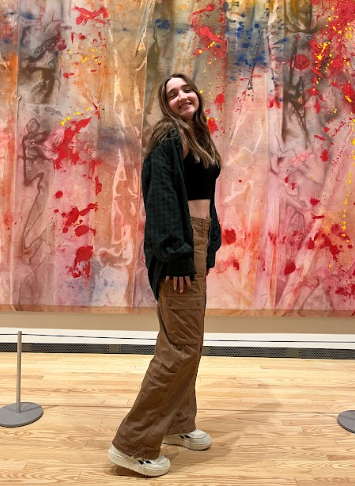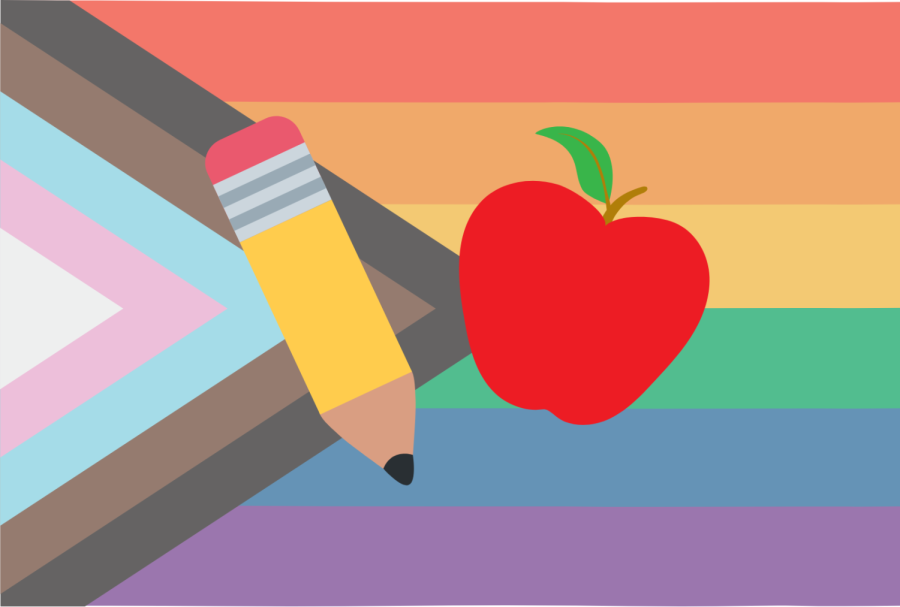Life as an LGBTQ+ Teacher
Two queer educators share their experiences with growing up and teaching.
In 1978, the pride flag was popularized as a symbol for LGBTQ+ members. It continues to represent the community today.
School is meant to be a safe space for everyone, but for many students, it doesn’t turn out that way. For members of the LGBTQ+ community, high school can be filled with many obstacles. So what brought two of Liberty’s LGBTQ+ teachers to return to a school environment, and how have their experiences shaped who they are today?
“I started teaching because school was the environment that always supported me… I just thought it was going to be one of the best ways to work directly with my community and provide something that benefited others,” explained Zachary Lively, an English teacher at Liberty, and an open member of the LGBTQ+ community.
Lively grew up and went to high school in DeWitt, a small city in Eastern Iowa. He started to feel as though he was unlike other kids as early as middle school.
“I knew that something was kind of different when I was in middle school. And then when I got into high school, I started to understand it about myself,” Lively said.
He went on to come out to close friends and family around his sophomore year.
“It wasn’t really until my junior year of high school that I was really open about talking about it,” he described.
But not everyone understands their own sexuality by high school like Lively did. Leah Carlson, a paraeducator at Liberty, wasn’t completely sure of her identity until later in life.
“I wasn’t super sure of my identity at the time. There just weren’t very many out [of the closet] LGBT people at school,” Carlson said.
Carlson grew up in the West Des Moines area, which is primarily suburban. Her high school was big, and because of this, her experience varies in comparison to students from more rural areas. With more states passing anti-LGBTQ+ laws, such as Iowa’s bill prohibiting transgender women from participating in high school women’s sports, it’s increasingly harder for both queer students and teachers to be themselves at school. Rural areas especially struggle with this. Close to 49% of LGBTQ+ youth in rural areas of the U.S. say that their community is very unaccepting of their community (The Trevor Project). Coming from a smaller town, Lively can contribute to this narrative.
“In terms of my sexuality, it was just something that people [at my school] didn’t really want to talk about. [It was] the type of thing that people wanted to put away and pretend didn’t exist,” said Lively.
High school can be a difficult time for many when it comes to self-discovery, which is why it’s important to shine light on LGBTQ+ stories within communities, rather than sweep queer history and people under the rug.
“I think it would’ve been nice if it [LGBTQ+ representation] had just been more present in my school… It probably would’ve helped me realize earlier,” Carlson explained.
Even though her school wasn’t outwardly unaccepting, it simply lacked information surrounding LGBTQ+ topics that could’ve helped her, and possibly many other students in figuring out their identities sooner.
Only about 46% of schools in the U.S. are open to discussing LGBTQ+ topics (CDC Division of Adolescent and School Health Study). But representation is a huge factor in helping queer students understand who they are, as well as educating all students on the community’s history and the issues they still face today. Fortunately at Liberty, we’re lucky to have a staff that doesn’t shy away from expressing it’s appreciation of queer students. But unfortunately, not all students can say the same.
“… in places like Dewitt, where I’m from, there was no sign of queerness anywhere. There were no books, posters, or groups. Anything that had to be made, had to be made from scratch,” Lively commented.
He and a few friends had to create their own GSA club after noticing that queer students at his school didn’t have a space for themselves.
Lively added, “When I started the GSA, we had a few faculty members and a number of parents who came in and wanted to shut it down.”
Gay-Straight Alliances, often known as GSA clubs, are student-led spaces that provide information and education to high school students on LGBTQ+ matters. They discuss sexuality and gender orientation in a way that makes high school students feel comfortable sharing how they feel and who they are. It’s groups like these that protect queer students from people who disapprove.
Lively spoke about a history teacher he had in high school, “We were having a discussion on gay marriage [in class], and he called on me and made me stand up and debate with him on the validity of gay marriage and whether it’s something that should even exist, in front of the whole class. I just remember being mortified because he seemed to be very specifically singling me out.”
For a community that’s had many of its members experience violence due to their sexuality, it’s imperative that schools take proper action against homophobia in order to protect them. But Lively’s school didn’t take these steps.
Lively said, “No repercussions were taken with him because he has a family. His wife’s another teacher [there], he’s got two kids. [The school was] just not gonna rock the boat, so absolutely nothing happened.”
Terrible experiences like these spur teachers like Carlson and Lively to come back to high school and give students at Liberty an experience that they didn’t get to have.
“What I love about teaching is being able to share what I know with other people. It’s a good fit, to be able to be a positive role model for young people,” Carlson said.
Both Carlson and Lively agree that Liberty has a great basis in terms of LGBTQ+ acceptance. Now, making sure that resources for queer students continue to grow is crucial. Simply having teachers within the community themselves can be a game changer for students struggling with their own identities.
“If you’re unique, you know it, and you rock it, it’s all about confidence. People will admire that and look up to you. It becomes less ‘Oh, that’s weird’, and more ‘That’s just who that person is and they’re doing it wholeheartedly, that’s cool’,” Carlson advised to any high schoolers struggling to express themselves.
Lively added, “Once you let go of ‘I need to present a certain way or I need to live up to a presumed expectation,’ life is so much more enjoyable. When you’re not constantly fixated on yourself, your identity, and how others perceive you, and you’re just able to live authentically, that to me is when you really start living.”

Piper is a senior at Liberty and this is her second year on staff as Copy Editor! She plays softball and participates in Liberty's art club. When she's...



